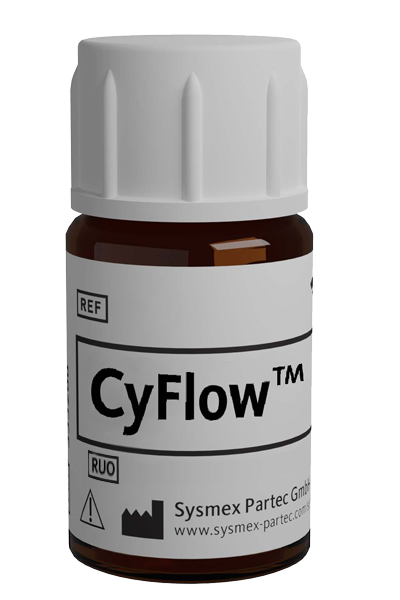CyFlow™ CD16 Alexa Fluor™ 700

| Alternative Name: | FcγRIII |
| Antibody: | Yes |
| Antigen: | CD16 |
| Application: | Flow cytometry |
| Clonality: | monoclonal |
| Clone: | 3G8 |
| Emission Maximum: | 723 nm |
| Excitation Maximum: | 702 nm |
| Field of Interest: | Immunophenotyping |
| Format/Fluorochrome: | Alexa Fluor™ 700 |
| Isotype: | IgG1 |
| Laser: | Red |
| Regulatory Status: | RUO |
| Source Species: | Mouse |
| Target Species: | Human, Non-Human Primates |
| Product number: | BC850725 |
For Research Use Only
| HLDA Workshop | HLDA V—WS Code NK80 |
| Quantity | 100 tests |
| Volume | 0.4 mL |
| Immunogen | Human neutrophils |
| Background Information | CD16 (FcγRIII) is a 50-65 kDa glycoprotein serving as a low affinity IgG receptor. Human FcγRIII is expressed in two forms - FcγRIIIA and FcγRIIIB. FcγRIIIA is a transmembrane protein of monocytes, macrophages, NK cells and a subset of T cells. It is associated with FcεRI-γ subunit and is responsible for antibody-dependent NK cell cytotoxicity. Mast cell FcγRIIIA is associated, moreover, with FcεRI-β subunit. Besides IgG, FcγRIIIA can be triggered also by oligomeric IgE. FcγRIIIB is a GPI-linked monomeric receptor expressed on neutrophils and is involved in their activation and induction of a proadhesive phenotype. |
| Usage | The reagent is designed for Flow Cytometry analysis of human blood cells. Recommended usage is 4·µl reagent·/ 100·µl of whole blood or 10^6 cells in a suspension. The content of a vial (0.4 ml) is sufficient for 100 tests. |
| Storage Buffer | The reagent is provided in stabilizing phosphate buffered saline (PBS) solution, pH ≈7.4, containing 0.09% (w/v) sodium azide. |
| Storage | Avoid prolonged exposure to light. Store in the dark at 2-8°C. Do not freeze. |
| Stability | Do not use after expiration date stamped on vial label. |
| Knapp W, Dorken B, Gilks W, Rieber EP, Schmidt RE, Stein H, von dem Borne AEGK (Eds): Leucocyte Typing IV. Oxford University Press, Oxford. 1989; 1‑1820. < NLM ID: 8914679 > | Doussis IA, Gatter KC, Mason DY: CD68 reactivity of non‑macrophage derived tumours in cytological specimens. J Clin Pathol. 1993 Apr; 46(4):334‑6. < PMID: 7684403 > | Metes D, Ernst LK, Chambers WH, Sulica A, Herberman RB, Morel PA: Expression of functional CD32 molecules on human NK cells is determined by an allelic polymorphism of the FcgammaRIIC gene. Blood. 1998 Apr 1; 91(7):2369‑80. < PMID: 9516136 > | Zhu X, Hamann KJ, Muňoz NM, Rubio N, Mayer D, Herrnreiter A, Leff AR: Intracellular expression of Fc gamma RIII (CD16) and its mobilization by chemoattractants in human eosinophils. J Immunol. 1998 Sep 1; 161(5):2574‑9. < PMID: 9725258 > | Wijngaarden S, van Roon JA, van de Winkel JG, Bijlsma JW, Lafeber FP: Down‑regulation of activating Fcgamma receptors on monocytes of patients with rheumatoid arthritis upon methotrexate treatment. Rheumatology (Oxford). 2005 Jun; 44(6):729‑34. < PMID: 15757966 > | Komano Y, Nanki T, Hayashida K, Taniguchi K, Miyasaka N: Identification of a human peripheral blood monocyte subset that differentiates into osteoclasts. Arthritis Res Ther. 2006; 8(5):R152. < PMID: 16987426 > | Congy-Jolivet N, Bolzec A, Ternant D, Ohresser M, Watier H, Thibault G: Fc gamma RIIIa expression is not increased on natural killer cells expressing the Fc gamma RIIIa‑158V allotype. Cancer Res. 2008 Feb 15; 68(4):976‑80. < PMID: 18281470 > | Choi EI, Wang R, Peterson L, Letvin NL, Reimann KA: Use of an anti‑CD16 antibody for in vivo depletion of natural killer cells in rhesus macaques. Immunology. 2008 Jun; 124(2):215‑22. < PMID: 18201184 > | Burt BM, Plitas G, Zhao Z, Bamboat ZM, Nguyen HM, Dupont B, DeMatteo RP: The lytic potential of human liver NK cells is restricted by their limited expression of inhibitory killer Ig‑like receptors. J Immunol. 2009 Aug 1; 183(3):1789‑96. < PMID: 19587011 > | Jeraiby M, Yahya KS, Depince‐Berger AE, Lambert C: Microbicidal activity measured by flow cytometry: Optimization and standardization for detection of primary and functional deficiencies. J Immunol Methods. 2017 Feb 28; 441:8‐14. < PMID: 27693641 >
